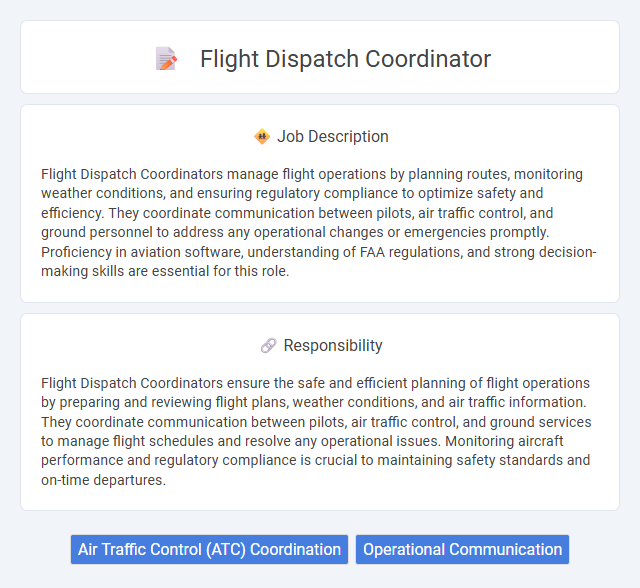
Flight Dispatch Coordinators manage flight operations by planning routes, monitoring weather conditions, and ensuring regulatory compliance to optimize safety and efficiency. They coordinate communication between pilots, air traffic control, and ground personnel to address any operational changes or emergencies promptly. Proficiency in aviation software, understanding of FAA regulations, and strong decision-making skills are essential for this role.
Individuals with strong analytical skills and the ability to remain calm under pressure are likely to be well-suited for the role of Flight Dispatch Coordinator. Those who thrive in fast-paced environments and possess excellent communication abilities may find this job aligns with their strengths. However, individuals prone to high stress or difficulty multitasking might face challenges adapting to the demands of this position.
Qualification
Flight Dispatch Coordinators must possess a strong understanding of aviation regulations and weather patterns, typically supported by an FAA Aircraft Dispatcher certificate. Proven experience in flight planning software and effective communication skills are essential for coordinating between pilots and air traffic control. Candidates often hold degrees in aviation management or related fields, emphasizing safety protocols and operational efficiency.
Responsibility
Flight Dispatch Coordinators ensure the safe and efficient planning of flight operations by preparing and reviewing flight plans, weather conditions, and air traffic information. They coordinate communication between pilots, air traffic control, and ground services to manage flight schedules and resolve any operational issues. Monitoring aircraft performance and regulatory compliance is crucial to maintaining safety standards and on-time departures.
Benefit
Flight Dispatch Coordinator positions likely offer benefits such as competitive salaries, health insurance, and retirement plans due to the critical nature of the role in aviation safety. Employees might also enjoy opportunities for career advancement and specialized training that enhance skill sets and job security. Flexible schedules and travel perks could also be part of the employment package, improving overall work-life balance.
Challenge
The role of a Flight Dispatch Coordinator likely demands managing complex schedules and real-time operational challenges under high-pressure conditions. Coordinators probably face unpredictable weather changes, air traffic delays, and regulatory compliance issues that require quick, critical decision-making. Successfully navigating these obstacles may significantly impact flight safety, efficiency, and overall airline operations.
Career Advancement
A Flight Dispatch Coordinator plays a critical role in ensuring the safety and efficiency of flight operations by planning routes, monitoring weather conditions, and coordinating with pilots and air traffic control. Career advancement opportunities include progressing to senior dispatch roles, operations management, or airline logistics, leveraging expertise in regulatory compliance and real-time problem-solving. Gaining certifications such as FAA Aircraft Dispatcher or equivalent international credentials significantly enhances prospects for leadership positions within aviation companies.
Key Terms
Air Traffic Control (ATC) Coordination
Flight Dispatch Coordinators play a vital role in Air Traffic Control (ATC) coordination by ensuring seamless communication between flight crews and ATC units to optimize route planning and enhance safety. They analyze weather patterns, airspace restrictions, and flight schedules to provide real-time updates and facilitate efficient air traffic flow. Their expertise in ATC protocols minimizes delays and supports compliance with aviation regulations, directly impacting operational efficiency and flight safety.
Operational Communication
Flight Dispatch Coordinators ensure seamless operational communication between pilots, air traffic control, and ground services to maintain flight safety and efficiency. They monitor weather conditions, flight plans, and regulatory requirements, relaying critical updates promptly to all relevant parties. Effective communication skills and real-time information management are essential for coordinating flight operations and resolving unforeseen issues quickly.
 kuljobs.com
kuljobs.com